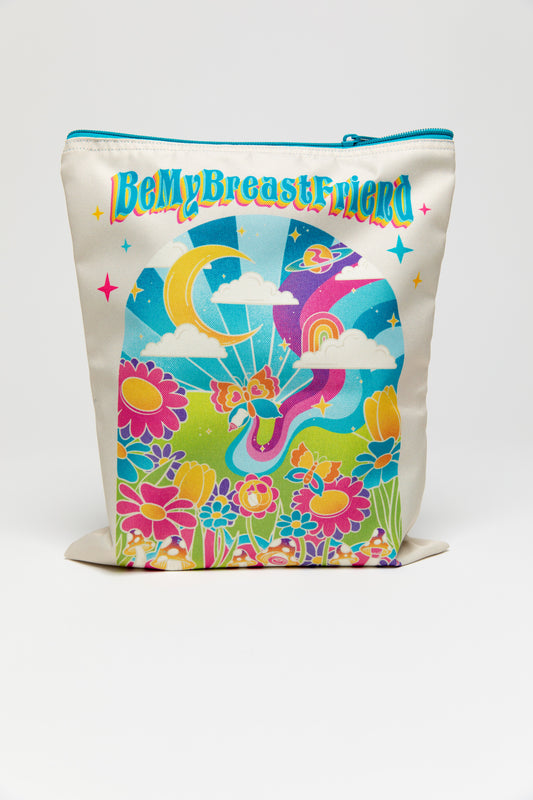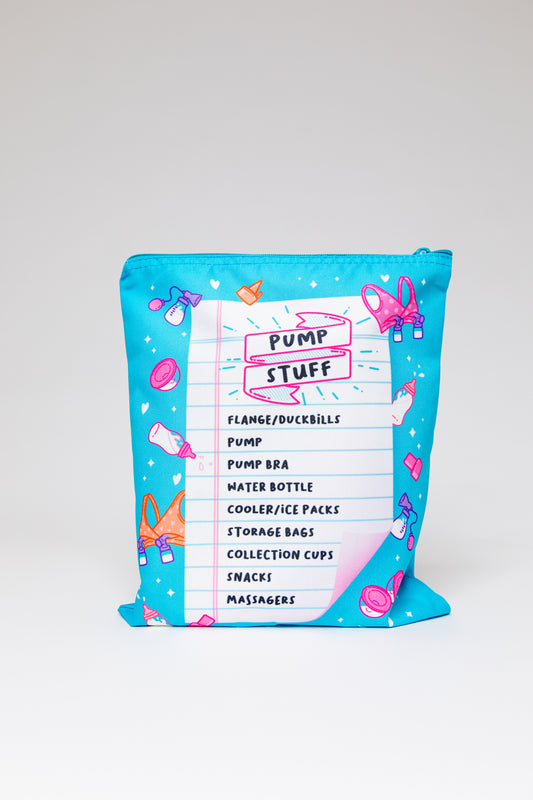
I love when people think breastfeeding is supposed to be this magical, perfect bonding experience where you and your baby gaze lovingly into each other's eyes while cherubs sing in the background. I mean don't get me wrong, it can be really beautiful! But in reality, it can also be messy and quite stressful.
One worrisome part of breastfeeding is stressing about whether or not you have enough milk for your baby. And maybe you've heard that stress itself can affect your supply! Oh my goodness, what a cycle! So, can stress really affect milk supply? Let’s dig into the science behind stress, hormones, and what you can do to keep the milk flowing (even on the days when you're ready to scream into a pillow).
The Science Behind Stress and Milk Production
Science tells us that chronic stress can have an impact on breastfeeding efforts. It doesn’t mean your supply is just going to vanish overnight, but if stress prevents you from adequately and regularly removing milk, your body may start to make less milk over time.
Let’s talk hormones. I promise not to take you back to high school chemistry, so I'll try to keep it simple. Though, it's a pretty complex system your body has! Effective breastfeeding depends greatly on two main players: prolactin (the milk-making hormone) and oxytocin (the let-down reflex hormone). When certain things interfere with those hormones, our milk production can be impacted negatively.
Cortisol - The Stress Hormone
When you're stressed, your body pumps out cortisol - the stress hormone. Babies actually benefit from some level of cortisol in breast milk as it helps develop their stress response systems. However, consistently higher levels of cortisol in your breast milk may not be great for your baby. Too much cortisol can also interfere with prolactin production over time, which potentially leads to less milk being made. Plus, high levels of cortisol can block oxytocin and slow down your let-down reflex. More on this next.
Oxytocin and the Milk Ejection Reflex
Moments of stress inhibit the release of oxytocin, making it harder for your let-down reflex to work. The result? Your milk flow slows down, and your baby gets frustrated, which usually makes you more stressed, and the cycle continues. Or, if you're pumping, you notice that the milk isn't flowing and that makes your stress levels skyrocket even higher.
Any stressful situation sends your body into fight-or-flight mode. If your body thinks you are running from a bear, it probably isn’t worried about producing breast milk. In other words, if you’re extremely tense, your brain may not single to release milk, making it harder for milk to flow. If this happens frequently, it could lead to low milk supply over time because your body isn't being told to continue removing milk at the rates your baby needs.
This is why many new mothers notice that they struggle to get a let-down when they’re anxious or distracted. There are so many things to worry about as new moms, and if you’re worried about making enough milk on top of it, that stress alone might be enough to slow down your milk ejection reflex. Add to that your baby struggling to latch, and the frustration can make you feel even worse.
If the stress of figuring out your latch is causing your breastfeeding experience to feel like a constant battle, exclusive nursing might not be the only option for you right now. Pumping—even just for a short time—can give you a much-needed break while ensuring your baby still gets the liquid gold. If you're considering this transition, check out my podcast Episode 23 - Transitioning from Exclusively Breastfeeding to Exclusively Pumping
The good news is that a little stress alone won’t permanently tank your supply—but how you handle that stress and prevent it from developing into chronic levels matters.
How to Reduce Stress and Support Milk Production
So now that we know the answer to the question, "Does stress really affect milk supply?," what can we do about it? You can’t exactly tell your newborn to chill out and take care of themselves for a few hours while you decompress. But, you can set yourself up for success by creating a breastfeeding-friendly, stress-reducing environment and relying on a good support system.

1. Prioritize Rest (Even When It Feels Impossible)
Yes, I know, telling a new mom to “just rest” is like telling a toddler to “just sit still.” But sleep deprivation on top of getting used to being new parents can make your stress levels go a little crazy. While getting a full night’s sleep may not be in the cards right now, even short naps can help reset your nervous system.
-
Try to sleep when the baby sleeps. Yes, I know everyone says this, but seriously, take the nap while a trusted friend or family member sits with your baby! Or, start making use of your crib during the day. Oftentimes the first nap of the day is a great time to start teaching your little one some independent sleep skills.
-
Let a family member or partner take over a feeding with a bottle after you pump so that you can rest. Nursing or bottle feeding in the beginning can last up to an hour, while a pump session may only last 20 minutes. If you're doing the math with me, pumping and having someone else bottle feed every once in a while as a nursing mom may allow you to get some extra zzz's.
- Use a white noise machine or relaxation techniques like stretching to help you fall asleep faster. Sound machines are not just for babies!
2. Set Up a Cozy, Relaxing Feeding Space
Your environment matters. If you’re trying to pump or nurse in a room with harsh lighting, tv screens, fighting toddlers, and other distractions, you might find it pretty difficult to relax. Set up a cozy feeding station with soft lighting, a comfortable chair, and all your essentials within reach. Need some inspiration? Check out my cozy bedroom must-haves to create the ultimate stress-free nursing space: Shop here.
3. Take Care of Your Body
Your body is working hard to nourish your baby’s needs, so give it the fuel it deserves. A balanced diet, enough water, and even a warm bath every now and again can help relax your muscles and encourage regular oxytocin release. Speaking of self-care, if you’ve been dealing with persistent headaches, breastfeeding might be a factor. I wrote a whole post about this, so if you’re curious, check it out here: Can Breastfeeding Cause Headaches?.
4. Get Support
You don’t have to do this alone. A support system can make a significant difference in your stress response. Whether it’s your spouse, a family member, or a friend who gets it, having someone to talk to can make all the difference. If you’re struggling to figure out the logistics of feeding, reach out to an international board-certified lactation consultant for professional help. And, don't be ashamed to talk to your health care provider about treatments for chronic stress or information about support groups. Sometimes, a little guidance is all it takes to get your breastfeeding efforts back on track.
Final Thoughts: Managing Stress for a Strong Milk Supply
So, does stress really affect milk supply? Short answer: Yes, maternal stress can mess with your breast milk production. But, stress won’t instantly make your milk dry up - it just prevents you from removing milk effectively, and can therefore lead to lower milk supply over time. The most important thing is to find ways to relax, get support, and prioritize self-care—even in the middle of the chaos that is new parent life.
At the end of the day, a breastfeeding mother can only do so much to prevent stressful life events from coming up. Give yourself grace, take deep breaths, and remember—you’re doing an amazing job. The mental stress is no joke. Thankfully, our breastfed babies don't need perfection; they just need us. Now go ask for a helping hand and take a warm bath to try to relax!





